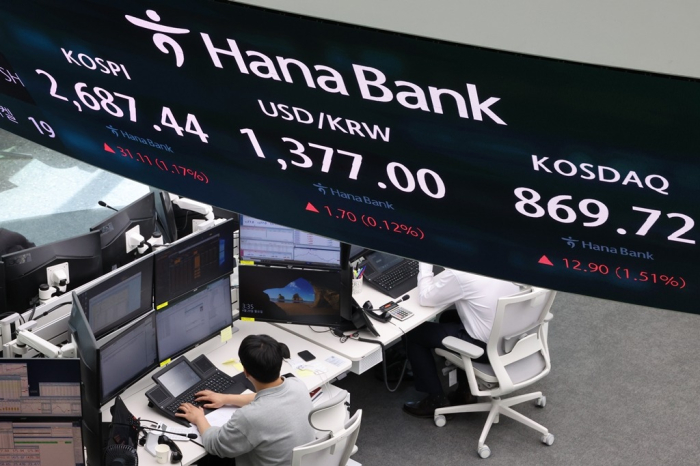Korea desperately seeks global bond index inclusion to rescue won
Bond inflows are expected to support the won currency, which has lost 6.5% against the dollar so far this year
By Apr 30, 2024 (Gmt+09:00)
When in S. Korea, it’s a ritual: Foreigners make stops at CU, GS25, 7-Eleven


Maybe Happy Ending: A robot love story that rewrote Broadway playbook


NPS yet to schedule external manager selection; PE firms’ fundraising woes deepen


Samsung steps up AR race with advanced microdisplay for smart glasses


Seoul appeal: Korean art captivates Indonesia’s affluent connoisseurs



South Korea is desperately working for inclusion on a global major bond index to save the ailing won, the second worst-performer among emerging Asian currencies, by attracting up to $58 billion to the local debt market.
Last month, FTSE Russell, the global index subsidiary of London Stock Exchange Group, decided to keep South Korea on the watch list for potential inclusion in its FTSE World Government Bond Index (WGBI).
The Ministry of Economy and Finance plans to hold investor relations sessions in key global financial hubs such as the UK, Hong Kong, Singapore and Japan from May, government and finance industry sources in Seoul said on Monday.
“The government aims to actively enact various measures to advance the foreign exchange market ahead of FTSE Russell’s decision on WGBI inclusion,” said a finance ministry official.
The index provider’s next review is scheduled for September.
The move comes as the South Korean won currency has lost 6.5% against the dollar so far this year, according to central bank data, becoming the second worst-performing emerging Asian currency after the Thai baht, which has weakened 7% against the greenback.
BOND INFLOWS EXPECTED
FTSE Russell has maintained South Korea on its watch list for potential inclusion in the WGBI since September 2022, saying the country has yet to meet the requirements for foreign investors' accessibility to the government bond market.
The finance ministry expected the index provider to include the nation on the major global bond index this September as the government has already implemented or is set to execute improvement measures such as the abolishment of foreign investor registration and foreign exchange market reform.
The government also hoped that Japanese investors, which have a strong influence on the WGBI inclusion, to support South Korea, given the enhanced diplomatic relation between the two countries.
About $2.5 trillion of funds worldwide was estimated to track the WGBI, which includes government bonds from more than 20 countries such as the US, the UK, Canada and Japan, analysts said.
The South Korean government bonds are predicted to make up about 2-2.5% of the WGBI once included on the index, which will attract 50 trillion won-80 trillion won ($36 billion-$58 billion), analysts said.
Such expected bond inflows are likely to lower market interest rates, cutting borrowing costs by up to 1.1 trillion won a year, the government and analysts said.
The local bond market saw an outflow of $3.4 billion in March after inflows of $2.5 billion and $1.9 billion in February and January, the Bank of Korea said earlier this month.
The BOK may not reduce its policy interest rate in the near term, which is seen as needed to boost Asia’s fourth-largest economy, given sustained inflationary pressure. BOK Governor Rhee Chang-yong on April 12 said it may be difficult to slash borrowing costs in the second half if oil prices rise further.
Write to Kyung-Min Kang at kkm1026@hankyung.com
Jongwoo Cheon edited this article.
-
 Sovereign bondsKorea yet to join global bond index for capital inflows
Sovereign bondsKorea yet to join global bond index for capital inflowsMar 28, 2024 (Gmt+09:00)
2 Min read -
 Foreign exchangeKorean won at 17-month low on Middle East woes, Fed rate view
Foreign exchangeKorean won at 17-month low on Middle East woes, Fed rate viewApr 16, 2024 (Gmt+09:00)
4 Min read -
 Foreign exchangeS.Korea to allow offshore investors to directly trade won
Foreign exchangeS.Korea to allow offshore investors to directly trade wonFeb 07, 2023 (Gmt+09:00)
2 Min read -
 Sovereign bondsKorea on watch list for WGBI inclusion; hoping for bond inflows
Sovereign bondsKorea on watch list for WGBI inclusion; hoping for bond inflowsSep 30, 2022 (Gmt+09:00)
3 Min read


